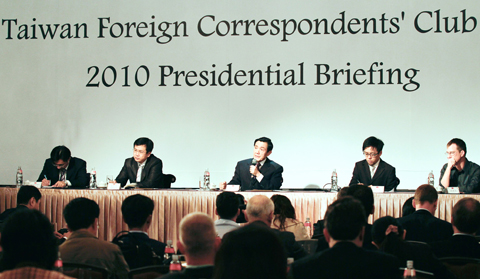President Ma Ying-jeou (馬英九) continued his campaign to explain his rationale for signing an economic cooperation framework agreement (ECFA) with China yesterday when he addressed the Taiwan Foreign Correspondents’ Club in Taipei.
In his brief introduction, Ma said that Sunday’s debate on an ECFA with Democratic Progressive Party (DPP) Chairperson Tsai Ing-wen (蔡英文) had helped increase the number of people who understood the trade pact, as well as public support for it, without providing sources.
“In the last 10 years, we have seen tremendous change in Asia. In year 2000, we had only three free-trade agreements,” Ma said in English. “By last year, the number went up to 58. Taiwan should not be isolated in this reform.”

PHOTO: MAURICE TSAI, BLOOMBERG
“I’ve always said that we can handle diplomatic isolation, but economic isolation is fatal,” the president said. “We have to do something about it.”
On whether an ECFA would have a similar political impact on Taiwan as the Closer Economic Partnership Agreement did on Hong Kong, Ma said Taiwan is not like Hong Kong, adding: “We are an independent country.”
None of the 12 agreements signed by his administration and Beijing in the past two years undermined Taiwan’s sovereignty, he said. None of them included “one China” or “one country, two systems,” nor will an ECFA, Ma said.
“There will be no political language in the ECFA documents,” Ma said, emphasizing that the pact would be purely economic.
However, turning to the possibility of signing free-trade agreements (FTA) with major economies in the region, Ma said that FTAs had “lots of political considerations,” which made them difficult to negotiate.
The DPP administration’s insistence on signing FTAs using a different name from its official WTO designation had made this situation worse and explained why Taiwan was only able to sign four FTAs with its Latin American allies during that period, Ma said.
The president characterized those agreements as inconsequential economically.
Other countries, which he did not name, have reportedly told his administration they would be willing to consider FTAs with Taiwan, but recommended he sign an ECFA with China first.
“The logic is very simple ... If we are able to sign an ECFA with the mainland [China], obviously the pressure on other countries will decrease,” Ma said. “Taiwan is the No. 18 trading country in the world. It’s also in their interest to trade with us and they will have the courage to do that [after an ECFA is signed].”
Ma said his FTA taskforce had many potential candidates, but would not specify how many deals he hoped to achieve and remained evasive on whether he had concrete evidence that Beijing would allow Taiwan to sign such agreements.

Alain Robert, known as the "French Spider-Man," praised Alex Honnold as exceptionally well-prepared after the US climber completed a free solo ascent of Taipei 101 yesterday. Robert said Honnold's ascent of the 508m-tall skyscraper in just more than one-and-a-half hours without using safety ropes or equipment was a remarkable achievement. "This is my life," he said in an interview conducted in French, adding that he liked the feeling of being "on the edge of danger." The 63-year-old Frenchman climbed Taipei 101 using ropes in December 2004, taking about four hours to reach the top. On a one-to-10 scale of difficulty, Robert said Taipei 101

A preclearance service to facilitate entry for people traveling to select airports in Japan would be available from Thursday next week to Feb. 25 at Taiwan Taoyuan International Airport, Taoyuan International Airport Corp (TIAC) said on Tuesday. The service was first made available to Taiwanese travelers throughout the winter vacation of 2024 and during the Lunar New Year holiday. In addition to flights to the Japanese cities of Hakodate, Asahikawa, Akita, Sendai, Niigata, Okayama, Takamatsu, Kumamoto and Kagoshima, the service would be available to travelers to Kobe and Oita. The service can be accessed by passengers of 15 flight routes operated by

Taiwanese and US defense groups are collaborating to introduce deployable, semi-autonomous manufacturing systems for drones and components in a boost to the nation’s supply chain resilience. Taiwan’s G-Tech Optroelectronics Corp subsidiary GTOC and the US’ Aerkomm Inc on Friday announced an agreement with fellow US-based Firestorm Lab to adopt the latter’s xCell, a technology featuring 3D printers fitted in 6.1m container units. The systems enable aerial platforms and parts to be produced in high volumes from dispersed nodes capable of rapid redeployment, to minimize the risk of enemy strikes and to meet field requirements, they said. Firestorm chief technology officer Ian Muceus said

MORE FALL: An investigation into one of Xi’s key cronies, part of a broader ‘anti-corruption’ drive, indicates that he might have a deep distrust in the military, an expert said China’s latest military purge underscores systemic risks in its shift from collective leadership to sole rule under Chinese President Xi Jinping (習近平), and could disrupt its chain of command and military capabilities, a national security official said yesterday. If decisionmaking within the Chinese Communist Party has become “irrational” under one-man rule, the Taiwan Strait and the regional situation must be approached with extreme caution, given unforeseen risks, they added. The anonymous official made the remarks as China’s Central Military Commission Vice Chairman Zhang Youxia (張又俠) and Joint Staff Department Chief of Staff Liu Zhenli (劉振立) were reportedly being investigated for suspected “serious